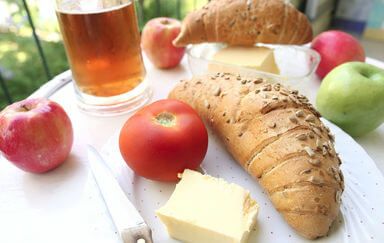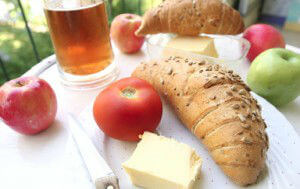
When it comes to carbs, many people are confused. Are they good? Are they bad? Should I go low carb, high carb, or even no carb?
The truth is, all carbs are not the same and body chemistry is not a one size fits all. Fruits and vegetables contain mostly carbs, and you should be filling your diet with as many of these fresh, organic foods as you can.
The body converts digestible, non-fiber, carbs into glucose which our cells use as fuel. Simple carbs break down quickly into glucose; complex carbs break down more slowly, entering the bloodstream gradually.
All carbohydrates are broken down into glucose before they are able to enter the bloodstream where insulin aids the glucose in entering the body’s cells. Some glucose is then stored as glycogen in the muscles and liver for later use, such as for providing energy for physical activity. If there is more glucose left than needed, the body stores this as fat.
Therefore, “no carbs” is certainly not the answer – carbohydrates are a nutrient that provides us with calories, or energy. They offer essential vitamins, minerals, fiber and phytonutrients needed to maintain body functions and to fuel workouts and other activities.
The thing to remember is that all carbohydrates are not created equal. Certainly, eliminating the ‘bad carbs’ from our diet is wise. These ‘bad carbs’ come from:
Refined flours such as what you’ll find in breads, pastries and other baked treats
- Sweets
- Sugary drinks
- Any and all processed foods
Avoiding carbs that are derived from grains, especially wheat, can also help many people to achieve better health as well as an ideal weight.
A healthy diet can include carbs, they should just mostly come from foods that offer plenty of beneficial nutrients rather than empty nutrition. There have numerous studies that indicate lower carb diets can assist with weight loss, increase muscle and help battle disease, but the key is “lower carb,” not “no carb.”
A diet that is too low carb can result in a lack of energy that can make it difficult to perform regular activities and workouts. It can also cause nausea, headaches, dizziness and fatigue.
 Fruits and vegetables are a rich source of quality carbs. Those that are high in fiber like avocados, broccoli, sweet potatoes, spinach and other dark greens are especially good, as are citrus fruits, bananas, pears, apples, melons and berries. Just remember to choose organic so you don’t get the toxins along with these healthy carbs, which could counteract some of the benefits.
Fruits and vegetables are a rich source of quality carbs. Those that are high in fiber like avocados, broccoli, sweet potatoes, spinach and other dark greens are especially good, as are citrus fruits, bananas, pears, apples, melons and berries. Just remember to choose organic so you don’t get the toxins along with these healthy carbs, which could counteract some of the benefits.
We hope we’ve helped you make sense of the confusion in the world of carbs so that you can make the best decisions for your health!
-The Alternative Daily

